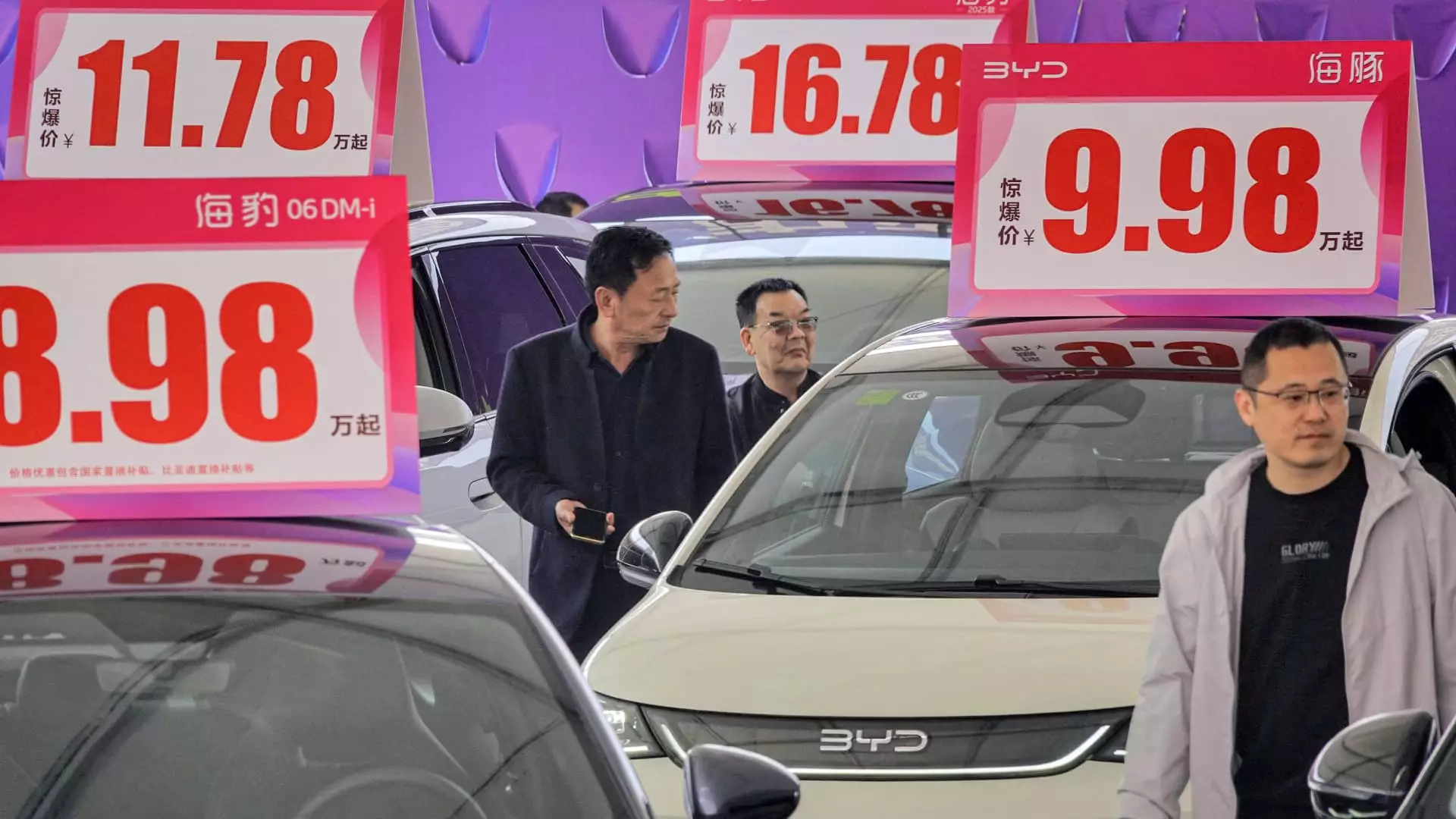The dynamic of competition within China’s electric vehicle (EV) sector has reached a boiling point, and it’s reshaping not just the domestic economy but also the international automotive landscape. Industry titan BYD has ignited a price war by implementing discounts of up to 30% on various models. This aggressive pricing, exemplified by the Seagull compact car’s drop to an astonishing 55,800 yuan (equivalent to about $7,750), signals a precarious state of affairs. What seems like an enticing offer to consumers is ruffling feathers among smaller Chinese automakers and creating a landscape marked by instability and fear.
Experts like Zhong Shi, an analyst at the China Automobile Dealers Association, describe the current state as chaotic. The ripple effect of BYD’s cuts has elicited considerable anxiety across the industry. With consumer demand already waning in the face of economic slowdown, the drastic price cuts suggest desperation rather than a strategy for sustainable growth. It’s a phenomenon reminiscent of predatory pricing practices that could potentially stifle innovation and lead to a market dominated by just a few players.
The Underlying Economic Turbulence
This fierce competition isn’t occurring in a vacuum; it’s a symptom of an economy struggling to find its footing. The automotive sector had previously been a beacon of positive growth in an otherwise lackluster economic climate. However, analysts note that the push to stimulate consumption through EV subsidies is merely band-aid politics, failing to address the root causes of economic stagnation. Morgan Stanley’s Chief China Economist Robin Xing has illustrated that the misalignment between supply and demand is exacerbating deflationary pressures, rendering any talk of rebalancing mere rhetoric devoid of actionable policy.
As price wars rage, the underlying question remains: how far can automakers push profits while also managing government pressures and consumer expectations? The precarious nature of this battle is not merely confined to financial metrics; it possesses the potential to impact innovation, quality, and overall market health.
The Real Estate Analogy: A Bubble on the Brink?
The comparison made by Great Wall Motors Chairman Wei Jianjun to the Evergrande fiasco is nothing short of alarming. He warns that the spiraling EV sector could be poised for an explosive downturn akin to the collapsed real estate sector. When a market becomes overly reliant on one sector—whether it be real estate or electric vehicles—the risks multiply exponentially. As dealers and investors become increasingly wary, one can’t help but wonder if we’re watching the early signals of a bubble waiting to burst.
This impending collapse could be largely self-inflicted, courtesy of reckless discounting strategies. Small automakers, already struggling, may not survive the fallout, thereby narrowing consumer choice and further entrenching the dominance of giants like BYD. This monopolization stands to derail the very innovation that once promised to put China at the forefront of the EV revolution.
Caught Between Domestic and International Markets
The reverberations of this competitive frenzy are not limited to China’s borders; they extend globally. Concerns over the potential impacts on international auto industries have already prompted reactions from economic powers like the European Union and the United States. Tariffs on imports of Chinese EVs suggest that these countries are preparing defensively against a perceived threat. This isolationist move is a double-edged sword; while it may temporarily shelter domestic manufacturers, it stifles international collaboration and innovation that could emerge from a healthy competitive environment.
Public sentiment arises that protectionism is merely delaying the inevitable result of a market adjusting to reality. As Chinese automakers bolster their presence abroad, they could turn the tides and dominate markets that previously leaned toward scalably produced, well-engineered vehicles. The European market’s recent data showing BYD outselling Tesla underscores this shift. Tesla’s painful 49% sales drop in Europe exemplifies just how volatile and unpredictable the global marketplace has become.
An Uncertain Future
In light of the increasing measures taken to counter competition and the rising costs associated with creating a viable supply chain, it’s clear that the path forward is fraught with challenges. Critics argue that if Chinese automakers do not recalibrate their strategies and prioritize long-term stability over short-term gains, they may be courting disaster—not only for themselves but for the auto industry worldwide.
The unfolding drama within China’s electric vehicle market represents an intricate dance of ambition, discomfort, and uncertainty that could either propel the nation to unprecedented heights or lead to an all-consuming implosion. It’s a powerful reminder that in the fast-paced world of electric mobility, what glitters can quickly turn to rust if the foundational principles of sound economic practice and sustainable growth are ignored.

